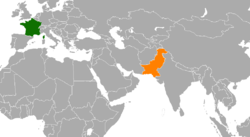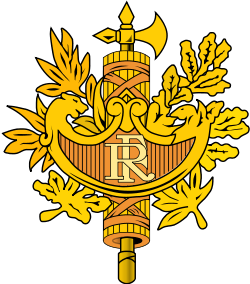France–Pakistan relations
 |
|
France |
Pakistan |
|---|---|
The France–Pakistan relations refers to the bilateral, cultural, and international relations between the Republic of France and the Islamic Republic of Pakistan. Historically bonded and friendly, the relationships are based on military, defence, cultural, educational cooperation and economic ties. Trade between the two countries is generally increasing with time.[1]
Country comparison
| |
| |
|---|---|---|
| Population | 65,350,000 | 176,516,000 |
| Area | 674,843 km2 (260,558 sq mi) | 796,095 km² (307,374 sq mi) |
| Population Density | 116/km2 (301/sq mi) | 214.3/km² (555/sq mi) |
| Capital | Paris | Islamabad |
| Largest City | Paris – 2,234,105 (12,161,542 Metro) | Karachi — 13,050,000 (13,205,339 Metro) |
| Government | Unitary semi-presidential constitutional republic | Islamic Republic, Federal Parliamentary democratic republic |
| National language | French (de facto and de jure) | Urdu (de facto), English |
| Main Religions | 58% Christianity, 31% non-Religious, 7% Islam, 1% Judaism, 1% Buddhism, 2% Other |
95-98% Islam (75% Sunni, 20% Shi'a), 1.6% Christianity, 1.6% Hinduism, others |
| GDP (nominal) | $2.712 trillion, $42,793 per capita | $270.8 billion ($1,049 per capita) |
| GDP (PPP) | $2.257 trillion, $35,613 per capita | $464 billion |
| Military expenditures | $62.5 billion | $7.0 billion |
History
The foreign relations between Pakistan and France were first established on 31 July 1951 when both countries agreed to open embassy services in each countries.France was the first non-Muslim state to recognize Pakistan.[2] On August 1960, a farewell trade treaty was signed; followed by import-export treaty that was concluded October 1966.[2] During the Cold war, France considered Pakistan as "state deserving attention", and had been a major foreign supplier of Pakistan Armed Forces.[3]
After the Cold war, France's foreign policy has been noted for decades for its special Gaullist flavour, which was not much altered under the long Presidency of socialist François Mitterrand (1981-1995).[3] French Presidents visited India more often than Pakistan, and Paris has never met the expectations of Islamabad regarding the U.N. resolutions on Kashmir.[3] The relations again suffered many set back in 1998-99 when Paris saw the Kargil episode as a dangerous Pakistan initiative, considering the new nuclearised regional context.[3] Though, France has always been to encourage dialogue between India and Pakistan, without offering mediation in such an intricate issue.[3] There was some impatience in Paris decision-makers circles when the Line of Control was crossed above Kargil in an obviously well prepared operation.[3]
Military and strategic cooperation
Since 1967, France had been an important partner, particularly for PAF and the Navy.[3] In 1967, France sold first batch of its Mirage fighters as well as sold the submarine technology to Pakistan. The PAF bought second-hand batch of Mirage fighters in 1990; followed by a contract signing in 1996 for the acquisition of 40 reconnaissance aircraft.[3] The PAF is the largest customer of France's aerospace industry with numbers of fighter and civilian aircraft having been sold to Pakistan since 1967 till the 2000s.[3] The Navy has also an established defence connection with France, the best known purchasing of Daphné class submarine and the submarine technology transfer of the Agost class which was signed in 1994.[3]
In 2009, France agreed to provide financial capital to expand the use of nuclear power in Pakistan. While, the officials at Islamabad termed it as "significant move", the Foreign service office maintained that: "France has agreed to transfer civilian nuclear technology to Pakistan."[4] The French Foreign ministry had confirmed that the country was ready, within the framework of its international agreements, to "co-operate with Pakistan" in the field of nuclear safety.[4] "This is so the Pakistan's programme can develop in the best conditions of safety and security", the French foreign officials added to APP.[4] After the agreement, France maintained that "this is the beginning of a civil nuclear partnership and the cooperation will be limited to nuclear safety."[5]
Trade and Economics relations
The first trade agreement was signed in 1966, and Pakistan is currently ranked as 65th import partner of France.[6] The bilateral trade was reached to US$313 million in 2009.[6]
See also
- Musa Javed Chohan: former ambassador of Pakistan to France and recipient of the Ordre National du Merite for the promotion of bilateral cooperation between France and Pakistan.
- Pakistanis in France
- French people in Pakistan
- Mehmood Bhatti (Fashion Designer)
- Karachi affair
References
- ↑ http://www.dawn.com/wps/wcm/connect/dawn-content-library/dawn/news/pakistan/16-french-nuclear-offer-hs-01
- 1 2 "Agreements and Treaties". Government of France. Embassy of France, Islamabad. Retrieved 16 September 2012.
- 1 2 3 4 5 6 7 8 9 10 Racine, Jean-Luc; et. al. "Pakistan and France: The Legacies of the Past and turn of the Century" (google docs). Institute of Strategic Studies, Islamabad. Islamabad, Pakistan: Global Security Perspectives and Worldlviews. Seminar Report. Institute of Strategic Studies, Islamabad, 2007, pp. 66-84. pp. 66–84. Retrieved 17 September 2012.
- 1 2 3 APP and other news agencies (15 May 2009). "Pakistan in 'French nuclear deal'" (stm). BBC Pakistan. BBC Pakisan. p. 1. Retrieved 17 September 2012.
- ↑ Jill Marie Parillo (July 24, 2009). "France-Pakistan Nuclear Deal in Play". Physicians for Social Responsibility (PSR). Retrieved 17 September 2012.
- 1 2 Research & Analysis Directorate / WTO Cell of Trade Development Authority of Pakistan. "Pakistan and France Trade Relations" (PDF). Research & Analysis Directorate / WTO Cell of Trade Development Authority of Pakistan. Retrieved 17 September 2012.

